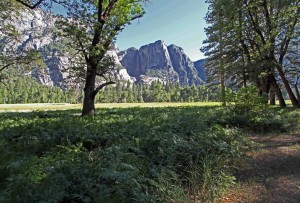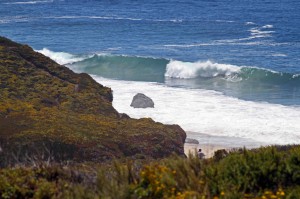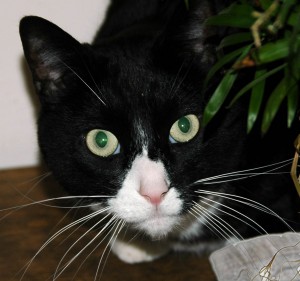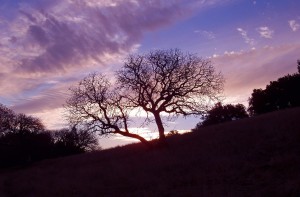Archive for Guest posts
Did Anyone Else Get RAINBOWS?
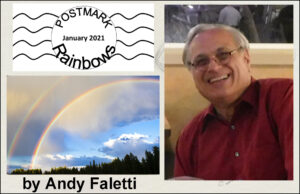
Did Anyone Else Get RAINBOWS?
— by Guest Writer Andy Faletti
And the Best thing about it?
The Pandemic could not do a Thing about it !
It had Not … One … Word …
to say about This…!
Download a PDF of this post: ConVivio_Rainbows_Jan_2021
= = = = = = = = = = = = = = = = = = = = = = = = = = = = = = = = = = = = = = = = = =
Call me weird but I love Rainbows.
At 5:00 today, I (and our puppies Jack and Bobby)
just saw the most
Beautiful
Double-Rainbow
The dogs like going for a ride.
So we happened to be driving down a big boulevard near us – on the wide curve
– next to nothing-but-fields of remaining open space East of Davis.
So the view was amazing.
Two Rainbow Legs on the South end – one a bit dimmer than the bold stark one –
– soared in a broadening arc, then lost their way above in the cloudy-dark sky.
I see a man taking pictures with his phone and realize I am not the only one who sees it.
Then the North end came into view, truncated, yet equally stark in hue.
So-o pretty – distinctive incredible color bands
“all the colors that you know…,”
don’t you know… : – )
And best … they went all the way to the ground – Right to where the pot of gold can be found
(not sure if the east end or west end has the fabled gold – the other surely has the leprechaun)
They usually do not touch the ground – this is only the second time I remember seeing that phenomenon.
Not even in Hawaii, when we have been struck by evanescent 5-minute evening-shower-rainbows…
To be completely accurate, I couldn’t see all the way to the ground, as
on the South end, there were some low white cloud wisps being stirred up.
Disturbed by the curving heavy boot of the rainbow,
as it dove and buried itself into the ground after its 180 degree journey from the North.
Families started coming out of their houses to view it, as it lasted at least 25 or 30 minutes.
(People perhaps were tipped off to it by neighbors posting on Nextdoor.com… ; – )
And cars going 50 mph both ways around the wide distended curve of the boulevard
were literally pulling over at the sight in order to (safely!) take in the view.
Whew.
I had to make a U-Turn instead of going to the Park (sorry, Jack and Bobby)
to see it again ! Then needed to finally get out and look…
And the Best thing about it?
The Pandemic could not do a Thing about it !
It had Not … One … Word … to say about This…!
… OK, so Andy’s lost it…
But anyway, it was amazing!
A harbinger of good, I’d like to imagine.
Wishing you a Double Rainbow where you are, too! … maybe tomorrow…
Andy Faletti
The Lady in the Harbor — An Attempt to Revise Her Welcome
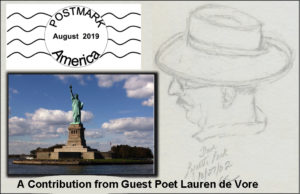
The Statue of Liberty has welcomed
immigrants to America since 1886. It has
proudly displayed Emma Lazarus’ poem
“The New Colossus” as the key statement
of that welcome since 1903. The poem has
been a central element of our American
heritage ever since. — PapaDan
Click here to download a PDF of this article: Cry_Shame_ConVivio_August_2019
= = = = = = = = = = = = = = = = = = = = = = = = = = = = = = = = = = = = = = = = =
A Startling News Story
On Tuesday, August 13, Ken Cuccinelli, acting director of U.S. Citizenship and Immigration Services (essentially, the head of the nation’s legal immigration system) raised eyebrows, and a lot of hackles, when he rewrote a central line of the poem at the base of the Statue of Liberty. (https://www.denverpost.com/2019/08/14/ken-cuccinellis-statue-of-liberty-poem/)
He rewrote the line this way: “Give me your tired and your poor who can stand on their own two feet and who will not become a public charge.” This “revision” of this essential part or our American heritage was part of his explanation of rule changes that make it more difficult for immigrants to obtain green cards if they take advantage of government benefits, such as food stamps and other assistance programs. Cuccinelli’s so-called “public charge” doctrine clearly targets poor immigrants and those most in need of sanctuary.
The details — and the purpose — of this new immigration doctrine, along with Cuccinelli’s edit of the poem on our welcoming statue, combine in a stark refutation of the entire spirit of Emma Lazarus’ poem. Lazarus wrote the poem in 1883 as part of fundraiser sponsored by newspaper tycoon Joseph Pulitzer to raise money for construction of the base for the Statue of Liberty. Lazarus herself came from a well-to-do Jewish family and became an advocate for immigrants in the early 1880s after witnessing the plight of thousands of newly arrived Eastern European Jews, forced to live in squalid overcrowded tenements, with little to no access to clean water, sanitation, education, or decent jobs. Her compassionate vision for America, a vision held by many others of that time (since her poem was selected from among many other submissions to be permanently mounted on the statue’s base) is clearly articulated in the sonnet’s closing lines:
The New Colossus
by Emma Lazarus (1883)
Not like the brazen giant of Greek fame,
With conquering limbs astride from land to land;
Here at our sea-washed, sunset gates shall stand
A mighty woman with a torch, whose flame
Is the imprisoned lightning, and her name
Mother of Exiles. From her beacon-hand
Glows world-wide welcome; her mild eyes command
The air-bridged harbor that twin cities frame.
“Keep, ancient lands, your storied pomp!” cries she
With silent lips. “Give me your tired, your poor,
Your huddled masses yearning to breathe free,
The wretched refuse of your teeming shore.
Send these, the homeless, tempest-tost to me,
I lift my lamp beside the golden door!”
As a member of an immigrant family, I find the continuing attack on immigrants to be powerfully hypocritical. It could be comical if it weren’t such a serious attack on the fundamental values of this nation’s identity, long held to be “a nation of immigrants.” My own grandparents came here to escape the poverty they knew in Southern Italy. They came with nothing to offer — they were illiterate and without valuable skills. A check of Mr. Cuccinelli’s family tree reveals that the rule change he is championing would likely have excluded his own Italian immigrant ancestors. (https://www.motherjones.com/politics/2019/08/cuccinellis-family-tree-suggests-his-new-immigration-rule-might-have-blocked-his-ancestors/) To our nation’s embarrassment, this rule change is just the latest in a series of immigrant exclusion efforts, counteracting the stated purpose of the immigration and asylum system imbedded in American law. Despite this recent disappointment, I must remember, even though this country sometimes falls short of its stated values, those values are still the ideals that have guided this country and its people for a long time.
But enough from me — let’s move on to a more interesting question: What would a revision of Emma Lazarus’ poem look like if one tried to “bring it up to date?” To answer this question, we turn to a familiar ConVivio contributor — our favorite local published poet, Lauren de Vore. You have seen her poetry presented in this space several times before.
What follows is Lauren’s description of her process in writing her revision of the original Emma Lazarus poem to fit our modern era — and, of course, the poem itself: “Cry Shame!”
Lauren’s Contribution
I first wrote this revisiting of “The New Colossus” in the fall of 2014. If you cast your mind back five years, you’ll remember the waves of immigrants flooding out of North Africa into Europe and the nationalistic backlash there. You’ll also remember President Obama’s sweeping executive action on immigration that attempted to do what Congress could not or would not do — revamp the nation’s broken immigration system in a practical, humane, and just way. Perhaps the most notable element of Obama’s effort was the Deferred Action for Childhood Arrivals or DACA program. The resulting media coverage, political grandstanding, and public discourse (much of it, to my West Coast liberal perspective, surprisingly anti-immigrant) spurred me to write my first version of “Cry Shame!”, for I felt then, as now, that many of the political and popular positions regarding immigration were shamefully hypocritical in light of the fact that America is a nation of immigrants. For most of us, I would wager that our immigrant forebears are only a few generations before us — our grandparents or great grandparents, probably the very people the exclusion acts of the day were aimed at.
I have sent “Cry Shame!” to both of California’s U.S. Senators, to the half-dozen or so East Bay Congressional Representatives, to California’s Governor, Lieutenant Governor, Secretary of State, and Secretary of Education, and to most of the East Bay’s state legislators. I have also sent it to The New York Times, The Washington Post, The Wall Street Journal, The San Francisco Chronicle, The San Jose Mercury News, and The Los Angeles Times, urging all of these recipients to publish it, post it, enter it into congressional and legislative records, use it on websites or in campaign materials. Not surprisingly, it was met with a resounding silence, not even a canned “thank you for your comment” email. Nonetheless, I persevere, recognizing that rejection is the writer’s lot. And so, I offer it to all of you ConVivio readers. Should “Cry Shame!” resonate with you, please — feel free to run with it, share it with friends, send it on into the wide world so it can do its small part to counteract the toxic hypocrisy and mean-spiritedness of today’s immigration debate.
Cry Shame!
A revisiting of the Statue of Liberty poem
by Lauren de Vore (2019)
I. Hypocrisy
Not like Ms. Liberty whose outstretched hand
And flaming torch did mutely bid welcome
To exiles seeking sanctuary from
Injustice in their far-off native land,
A barrier in fact and mind’s been built
Against newcomers yearning to breathe free.
Whence came such coldness and hypocrisy?
Have we forgotten all the blood we spilt
For freedom’s sake on foreign soil that would
Now turn our backs on those who seek the same
On our own shores, and doing so defame
Th’ideals for which America once stood?
A travesty that now our borders shout,
“You homeless, poor, and tempest-tost—keep out!”
II. Truths Self-Evident
How short, how fickle is the memory
Of those who’d shut this country’s golden door,
And in the closing willfully ignore
That not so long ago t’was they, t’was we
Who were the immigrants. For then, as now,
The hunger for a better life did drive
Them on to seek a place where they could thrive,
This land where founding fathers did avow,
As truths self-evident, that all men are
Created equal (women too) with right
To life and liberty and chance to fight
For happiness ‘neath freedom’s beacon star.
Such is the dream of all of life’s outcasts,
As true today as generations past.
III. Cry Shame
Cry shame on all false patriots, on all
Who stain their heritage fear-mongering
‘Gainst incomers with nonwhite skin, who sling
Their vitriol on any who’d forestall
Such bigotry. There is no honor in
A land that claims to champion liberty
Yet fences out th’oppressed, that piously
Hides prejudice behind flag-waving din.
Never forget, this country’s built upon
The backs, the blood of immigrants. They are
Our past, they are our future too, they are
America. If welcome be withdrawn,
Our star will dim, our greatness will decay.
We must with Liberty relight our way.
© Lauren de Vore (September 2014; revised August, 2019)
See Lauren’s previous Guest Poet offerings: https://convivio-online.net/lauren-celebrates-national-poetry-month/
A Faletti Poetic Contribution
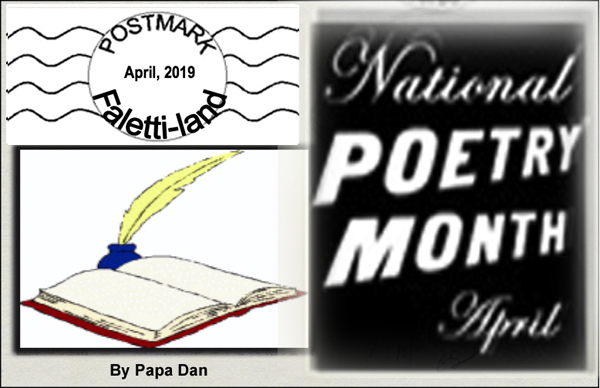
Today, my nephew Andrew Faletti, serves as the Literary Agent for his brother Stephen. In honor of National Poetry Month, Andy offers a poem Steve wrote one January afternoon in 1973, when Steve was a Freshman at Santa Clara University and Andy was in the 9th grade in Antioch, California. Take a look.
Andy writes: “The author (my brother Stephen Faletti) … decades ago submitted to me, as his “official” “agent,” some of his writings to be potentially published. I offered pieces to various poetry magazines and journals — surely hoping that my 15% of any awards would cover the postage and envelopes. ALAS: The poem is no less excellent for my failure to find a publisher.”
= = = = = = = = = = = = = = = = = = = = = = = = = = = = = = = =
Happiness Is Spring — By Stephen Faletti, written one afternoon in January
I strolled along the lively lane
the sun low in the sky;
Somehow I felt a hint of spring,
I’m sure I don’t know why.
It may have been the cool crisp air
Which carried to my ear
the ringing laughter of the kids
Who leapt from houses near;
Or maybe all the birds that chirped
And soared from tree to tree,
Or just the buzzing hum and sound
Of life’s activity.
Then suddenly I chanced to see,
A bit off to the right,
A bushy-tailed small gray squirrel;
It’s fur was shining bright.
I watched it as it skipped around;
It seemed to dance with glee.
And all its wondrous happiness
Became a part of me!
I finally decided to
Continue on my way;
As soon as I began to move
It scampered far away.
That little squirrel of fur so bright
Had made me glad to be;
It may have been the month of snow
But it was spring for me!
= = = = = = = = = = = = = = = = = = = = = = = = = = = = = = = = = = = = = = = = = = =
Several of you contributed to National Poetry Month.
In case you missed them, here are links to five that have been posted before this one:
From Dorty: https://convivio-online.net/national-poetry-month-is-here-april-2019/
From Lauren: https://convivio-online.net/lauren-celebrates-national-poetry-month/
From Gretta: https://convivio-online.net/peek-a-boo-where-are-you/
From Steven: https://convivio-online.net/steve-peterson-celebrates-national-poetry-month/
From Janet: https://convivio-online.net/national-poetry-month-janets-favorites/
National Poetry Month: Janet’s Favorites
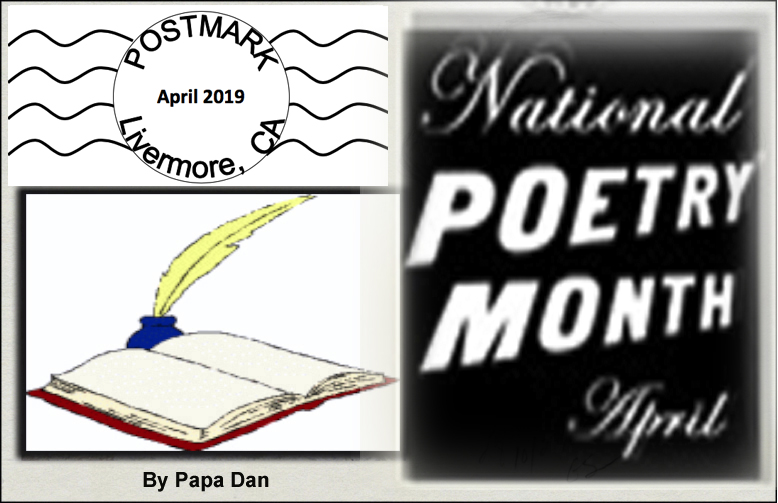
Today,
Janet Pipes offers four of her favorite poems
in honor of National Poetry Month. Take
a look.
I hope you are enjoying National Poetry Month. I expect at least
one more NPM contribution before the month is over. Stay tuned.
Click here to download a PDF of this post:
Several of you contributed to National Poetry Month.
In case you missed them, here are links to four that have been posted so far:
From Dorty: https://convivio-online.net/national-poetry-month-is-here-april-2019/
From Lauren: https://convivio-online.net/lauren-celebrates-national-poetry-month/
From Gretta: https://convivio-online.net/peek-a-boo-where-are-you/
From Steven: https://convivio-online.net/steve-peterson-celebrates-national-poetry-month/
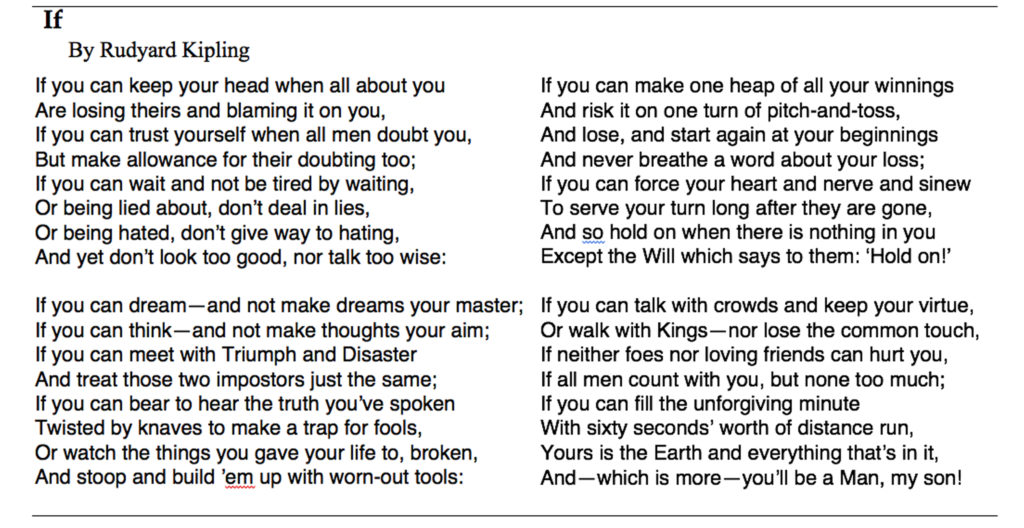
Dreams
By Langston Hughes
Hold fast to dreams
For if dreams die
Life is a broken-winged bird
That cannot fly.
Hold fast to dreams
For when dreams go
Life is a barren field
Frozen with snow.
Desiderata
By Max Ehrmann
GO PLACIDLY amid the noise and the haste, and remember what peace there may be in silence. As far as possible, without surrender, be on good terms with all persons.
Speak your truth quietly and clearly; and listen to others, even to the dull and the ignorant; they too have their story.
Avoid loud and aggressive persons; they are vexatious to the spirit. If you compare yourself with others, you may become vain or bitter, for always there will be greater and lesser persons than yourself.
Enjoy your achievements as well as your plans. Keep interested in your own career, however humble; it is a real possession in the changing fortunes of time.
Exercise caution in your business affairs, for the world is full of trickery. But let this not blind you to what virtue there is; many persons strive for high ideals, and everywhere life is full of heroism.
Be yourself. Especially do not feign affection. Neither be cynical about love; for in the face of all aridity and disenchantment, it is as perennial as the grass.
Take kindly the counsel of the years, gracefully surrendering the things of youth.
Nurture strength of spirit to shield you in sudden misfortune. But do not distress yourself with dark imaginings. Many fears are born of fatigue and loneliness.
Beyond a wholesome discipline, be gentle with yourself. You are a child of the universe no less than the trees and the stars; you have a right to be here.
And whether or not it is clear to you, no doubt the universe is unfolding as it should. Therefore be at peace with God, whatever you conceive Him to be. And whatever your labors and aspirations, in the noisy confusion of life, keep peace in your soul. With all its sham, drudgery and broken dreams, it is still a beautiful world. Be cheerful. Strive to be happy.
The New Colossus by Emma Lazarus
By Emma Lazarus
Not like the brazen giant of Greek fame,
With conquering limbs astride from land to land;
Here at our sea-washed, sunset gates
shall stand
A mighty woman with a torch, whose
flame
Is the imprisoned lightning, and her
name
Mother of Exiles. From her beacon-hand
Glows world-wide welcome; her mild eyes
command
The air-bridged harbor that twin cities
frame.
“Keep, ancient lands, your storied
pomp!” cries she
With silent lips. “Give me your
tired, your poor,
Your huddled masses yearning to breathe
free,
The wretched refuse of your teeming
shore.
Send these, the homeless, tempest-tost
to me,
I lift my lamp beside the golden
door!”
Steve Peterson Celebrates National Poetry Month
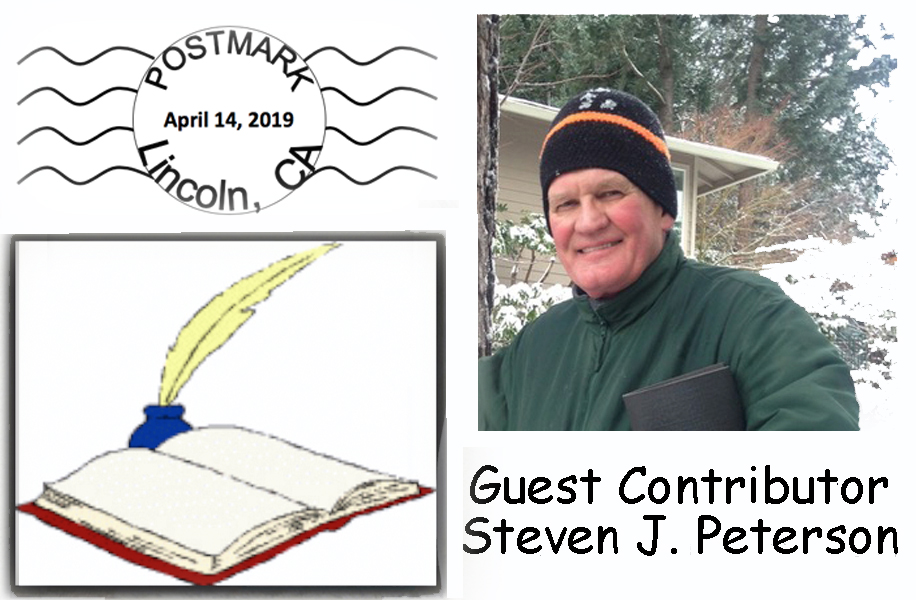
In response to our celebration of National Poetry Month and old friend, and former ConVivio contributor Steven J. Peterson, offers two of his favorite poems.
Steve has appeared on ConVivio before as a
Guest Storyteller. His previous appearance
on ConVivio can be found at:
https://convivio-online.net/gratitude/
Click here to download a PDF of this post:
Steven writes:
Since I read your ConVivio post requesting poems, I have
been thinking about poems that I like.
I recalled that in the 1980s I read a lot of poetry, but have not read poetry
with any consistency in the past twenty years. Makes me wonder how decades slip by so
quickly.
I recalled that when I was in high school I was charmed by Dylan Thomas’s “Fern Hill,” especially the opening line: “Now as I was young and easy under the apple boughs,” which made me think of the first “serious” play I attended at Moorhead (Minnesota) State College, these days called Minnesota State University at Moorhead (MSUM). The play was “Dylan” by Sidney Michaels, written in 1964. I saw it performed in April of 1966 near the end of my junior year of high school, about six weeks before my family moved from Minnesota to California. I thought it was a “great” play, but what did I know? I was two months away from my seventeenth birthday. I would like to see that play again. But never mind about that.
Below are two poems I like, “The Red Wheelbarrow” and “Where They Were and What They Were Doing.”
Steve
============================
The Red Wheelbarrow
by William Carlos Williams, Published in 1923
so much depends
upon
a red wheel
barrow
glazed with rain
water
beside the white
chickens.
Where They Were and What They Were Doing
by Matt Cook
I was looking through Milwaukee newspapers
From the day after John F. Kennedy was shot-
There was this auto body worker
Who brought his BB gun to work that day;
He was arrested for shooting his BB gun
Out the windows of the body plant
At passing automobiles-
That’s where he was and what he was doing
On the day President Kennedy was assassinated.
There was this biochemist.
He was giving this speech at some university in town-
He was inviting the audience to imagine
A strain of pneumonia bacteria
That was wearing a heavy armor suit that was actually made of protein–
That was his public speaking metaphor.
His point was that the protein would act like
A shield against white blood cells.
That’s what that guy was up to that day.
And just outside of town somewhere,
A car slammed into a truck on a rainy highway.
The car guy died of head injuries;
The truck guy was in satisfactory condition with neck pain.
In satisfactory condition with neck pain-
That’s where that guy was, and what he was doing.
The day President Kennedy was shot,
These kids broke into a junior high school.
They stole twenty dollars worth of stamps,
And smashed up an aquarium.
That was their story;
That’s where they were and what they were doing.
“Where They Were and What They Were Doing” by Matt Cook, from In the Small of My Backyard. © Manic D Press, 2002.
Peek-a-Boo, Where Are You?
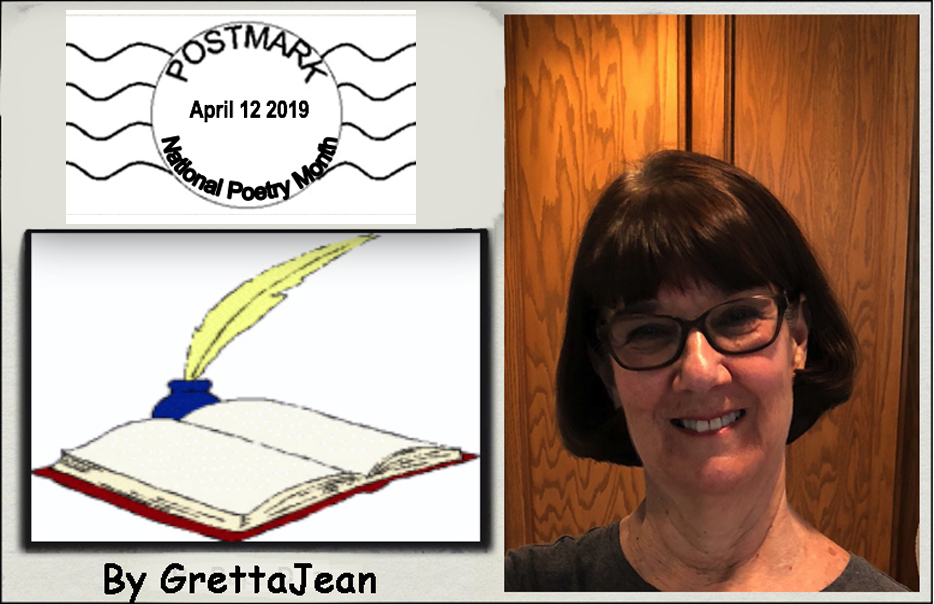
Take a Peek on the lighter side of poetry.
Gretta makes a contribution to
National Poetry Month with this poem.
Gretta has appeared on ConVivio before
with her poetry. Her previous appearance
on ConVivio can be found at:
https://convivio-online.net/poetry-and-plein-air/
Click here to download a PDF of this post:
= = = = = = = = = = = = = = = = = = = =
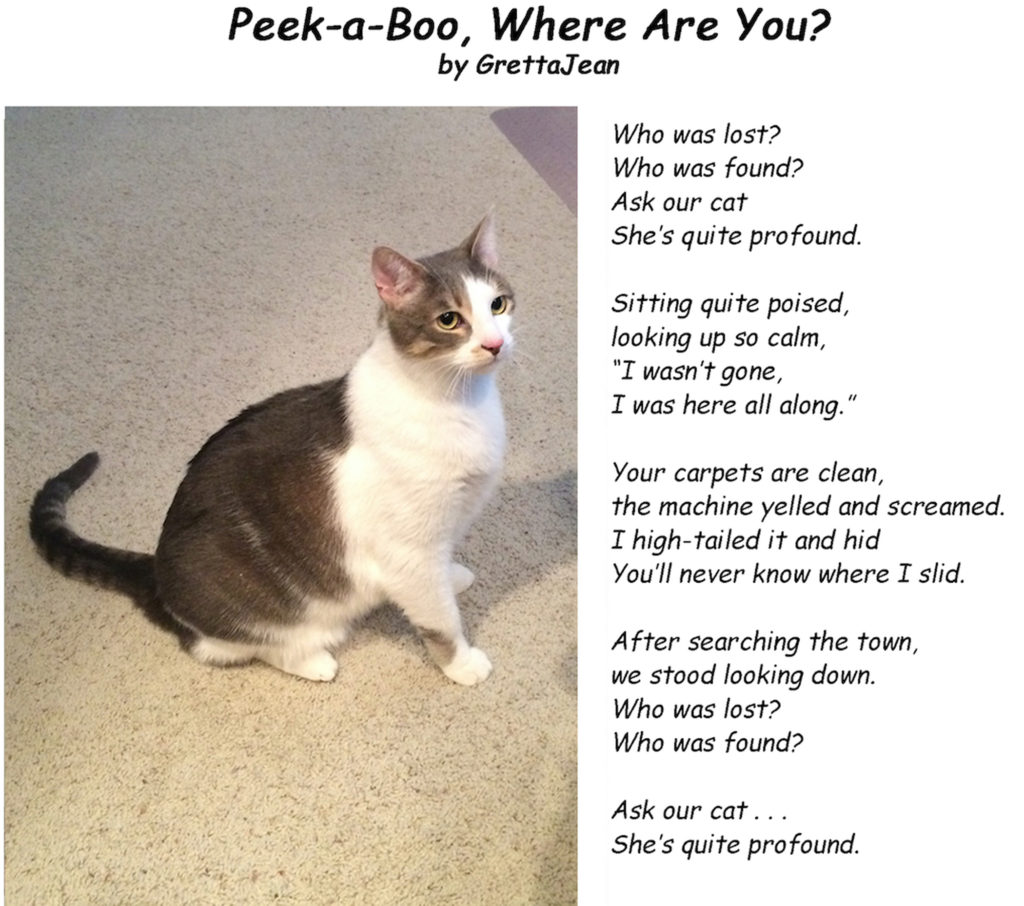
Lauren Celebrates National Poetry Month
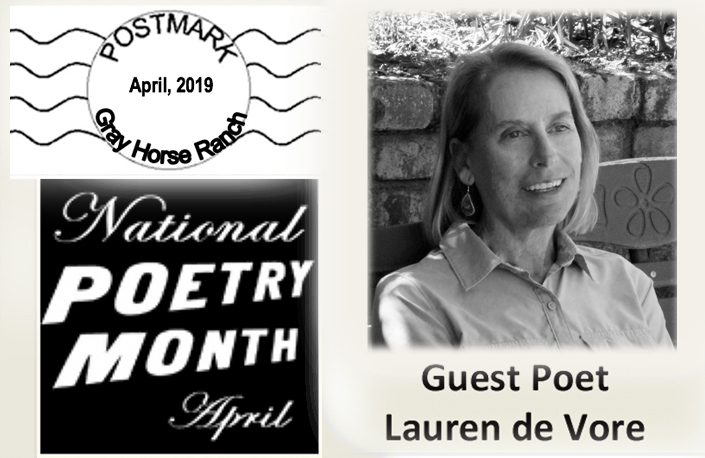
Once again, ConVivio celebrates National Poetry Month with a series of ‘poetic’ posts. Today we are privileged to feature some recent poems by Lauren de Vore, a published Bay Area poet who has appeared on ConVivio a few times before as a Guest Poet.
Enjoy!
.
Click below to download a PDF of this post:
.
Reflections on Events, Current and Otherwise
As much as I try not to dwell on unpleasant things, they have a nasty habit of intruding, kind of like the whine of unseen mosquitos that drives one indoors on an otherwise lovely summer night, into my thoughts and poems. Thus the following…
A short soapbox rant:
Shout it from the Rooftops
Shout it from the rooftops
Shout it from the pulpits and the streets
Shout it at the gas-n-stops
Shout it in your texts, your posts and tweets
The emperor is naked
His crown is but a fake orange lacquered mop
His palace is a house of cards
His courtiers a bunch of spineless fops
Look behind the backdrops
Look past all the bombast and the pomp
Look beyond the photo ops
He’s in bed with those who own the swamp
See the cheating and the lies
See the malice and the venal spite
See how freedom bleeds and dies
Each time hate and chaos trump what’s right?
Blind are those who will not see
Ignorant the ones who will not think
Fight, resist, unwaveringly
Else into that stinking swamp we sink
= = = = = = = = = = = = = = = = = = = = = = = =
Some questions asked and answered:
Because
The paleo man hefted his club,
Brought it down hard on the paleo deer.
Eyes stared back from the blood-soaked ground
Asking why, why do you do this to me?
Because I have the club and you do not.
The lord of the manor lifted his crop
And slashed it across the peasant’s face.
Sullen eyes glared up from the mud
Asking why do you do this to me?
Because I’m of the purple and you are not.
The whaler launched his harpoon,
The big game hunter sighted his prey
And sapient eyes gazed back through the lens
Asking why, what harm have I ever done you?
Because I hold the weapon and you do not.
The slave owner cracked his whip, the officer swings his baton,
A mother, a father raises hand or fist,
And innocent eyes, the eyes of the beaten ask why.
They’re stronger, they’re meaner, they’re in command,
And you, poor soul, are not.
The faith-fueled fanatic waves his torch,
The zealot of left, right or center his flag,
With nary a care for another’s pain, nary a thought
As to why each hates the other one so,
For they are righteous and everyone else be damned.
A god in his heaven rallies his wrath,
His thunder and lightning and hurricanes,
And hurls them down hard onto man below.
And man in his clueless disbelief
Asks why, why do you do this to me?
= = = = = = = = = = = = = = = = = = = = = = = =
Observation on the dubious value of barriers:
Walls
Barricades, fences, and walls
Partitions nature abhors
In the end, every one falls
Over all, time’s army pours
Palisades, ramparts, and dikes
Constructs of hubris and fear
Mindset of rulers and reiches
History’s lesson is clear
For every wall, build a door
For every fence, build a stile
Never forget what they’re for
Else to the despots, seig heil!
= = = = = = = = = = = = = = = = = = = = = = = =
Commentary on apparent American values with regard to immigration:
Immigrants
Two caravans head north,
Driven forces beyond their control.
The miles are long,
Grueling and perilous,
Fraught with predators of every ilk.
Death and despair
Thin their numbers,
But the caravans push on,
Sinuous entities seeking
A land of peace and plenty,
For there is no going back;
Going back is certain death.
Far better to venture into the unknown,
To hope against hope,
And trust whatever powers there be
To guide them to safety.
And when at last they arrive?
Jubilation greets the one,
Reverence and joy, festivals and delight.
And the other? The other is met
With guns and walls, with scorn
And denigration and detention.
Two caravans of immigrants
Seeking sanctuary.
Who knew one had to be decked
In orange and black butterfly wings
To be welcome.
= = = = = = = = = = = = = = = = = = = = = = = =
In memory of Sandra Parks, Steve Slaughter, and the countless other victims of senseless violence:
= = = = = = = = = = = = = = = = = = = = = = = =
Cogitations of a sleepless night:
Past Midnight
It was one of those nights
When her brain wouldn’t turn off
As she lay in bed, a lone soul keeping vigil
While the rest of the world slept.
The grandfather clock in the front room
Te-tick-tocked the seconds away,
A-lone-all a-lone-all a-lone it repeated.
Yet she did not need a clock to tell the time,
For the radio was quietly playing,
And on the radio, it’s always past midnight.
The measured cadences of NPR
Or the late-night DJ talking, talking, talking
To himself, to her, to the brother-slash-sisterhood
Of night owls and insomniacs,
Unknown to each other yet connected
By invisible airwaves. Soon the night
Will turn to dawn and she will rise
To face the day, but it’s always
Past midnight on the radio.
= = = = = = = = = = = = = = = = = = = = = = = =
And in the night, remembering…
Empty House
She wanders through the house, its lone occupant.
A faint trace of her youngest lingers in one room
And if she looked she’d likely find an old shirt
Or shoe, but she closes the door and wanders on.
It used to be so full of noise and bustle,
Husband and children and critters, everyone
Rushing this way and that at the top of their lungs.
But the hamsters and fish and dogs grew old and died,
The kids grew up and away, and the husband
Took up with a new and improved model of wife.
The house is silent now, dust-free and orderly
After all the years of nagging and fussing
Over messy rooms and muddy floors. Everything
Is just the way she likes it. Only it’s not.
For the house is empty, and she’s becoming
A ghost. Maybe, she thinks, she should get a cat.
= = = = = = = = = = = = = = = = = = = = = = = =
Visioned while standing with my horse as he grazed in the morning sun:
Ah, To Be Grass
Supine I lie
Face to the sun
Earth bed beneath
Taste the rain, the fine champagne
The dark aged chocolate loam
Root finger toes reach out and grasp
Holdfasts to the world below
Chlorophylled, wind-waved
My hair covers the rough
And smooth like a velvet shroud
Trodden, trampled
Grazed, parched, fired, frozen
I am dis-tressed
Beaten down, but not beaten
For come rain, come spring
All is green again
Ah, to be grass
= = = = = = = = = = = = = = = = = = = = = = = =
Reaction to being addressed by a server too young to know better:
Ma’am’d be Damned!
When did I turn from a miss to a ma’am,
From mademoiselle to madam?
The face in the mirror looks mostly the same,
To all of my teeth I lay claim,
I’m slim in the hip, my pulse doesn’t skip,
On mem’ry I’ve got a firm grip.
With gadgets and tech I’m fairly adept,
Up with Kimmel, Colbert I have kept;
Though hip hop and rap leave me quite cold,
Lin Man Miranda is gold.
I love anime and practice feng shui,
So what is it gives me away?
Have I some aura, some faint pheromone,
Does my voice quave some telltale tone?
For I’m forced to admit, I’m tempted to spit
Or at least indulge in a snit
Whenever I’m hailed with madam or ma’am,
That unwanted age-implied slam.
Can you not see I’m just ent’ring my prime
With many a hill yet to climb,
And per adage most sage, years are no gauge
Of actual sine qua non age.
So till I start flaunting sensible shoes,
Start dying my gold-y locks blue,
Until I appear in bright purple clothes,
In red hats with feathers and bows,
Humor please, if you’d be so polite,
For someday you’ll be in my plight;
Say ms if you must or miss if you will,
And all will be cool, will be chill.
I may be old mutton dressed up as spring lamb,
But madam’d or ma’am’d I’ll be damned!
National Poetry Month Is Here — April 2019
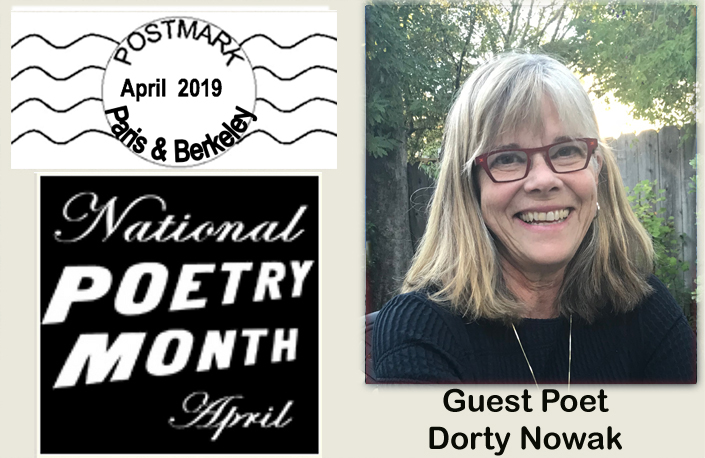
Dorty Nowak is a writer and artist living in Paris and Berkeley who writes frequently about the challenges and delights of multi-cultural living. Among life-long achievements, she helped found the Oakland School for the Arts and contributes to artistic projects on two continents. Dorty was ConVivio’s first ‘Guest Poet’ (has it really been) nine years ago.
We welcome her back as today’s ‘Guest Poet.’
— Click below to download a PDF of this post:
◊◊◊◊◊◊◊◊◊◊◊◊◊◊◊◊◊◊◊◊◊◊◊◊◊◊◊◊◊◊◊◊◊◊◊◊◊◊◊◊◊◊◊◊◊◊◊◊◊◊◊◊◊◊
ConVivio Again Presents “Guest Poets” for National Poetry Month
In celebration of National Poetry Month, Dorty Nowak returns to ConVivio and offers the following poems by “two of the greatest in the English language.” She observes that “old age and death have long been fertile subjects for poets, among them T.S. Eliot and Dylan Thomas.” In that category, she offers Eliot’s “The Love Song of J. Alfred Prufrock” and “Do Not Go Gentle Into That Good Night” by Dylan Thomas. And, as she has said before, “because I’ll never pass up a chance for extra credit” she gives us one of her own creations.
From Dorty Nowak
Dorty introduces Eliot’s “The Love Song of J. Alfred Prufrock” with a story: “Recently I listened to a recorded talk Eliot gave in 1950 in which he said “The Love Song of J. Alfred Prufrock” embarrassed him. Since that remarkable monologue helped catapult him, at age twenty-six, to fame, I was surprised. Eliot didn’t elaborate on his embarrassment, leaving me to assume it was because he considered himself not yet a master of his craft. However, poetics aside, Eliot created in ‘Prufrock’ a narrator poignantly and perceptively meditating on the limitations of age. For a young poet to have accomplished that is nothing to be embarrassed about.”
The
Love Song of J. Alfred Prufrock
by T.S. Eliot
S’io credesse che mia risposta fosse
A persona che mai tornasse al mondo,
Questa fiamma staria senza piu scosse.
Ma percioche giammai di questo fondo
Non torno vivo alcun, s’i’odo il vero,
Senza tema d’infamia ti rispondo.
Let us go then, you and I,
When the evening is spread out against the sky
Like a patient etherized upon a table;
Let us go, through certain half-deserted streets,
The muttering retreats
Of restless nights in one-night cheap hotels
And sawdust restaurants with oyster-shells:
Streets that follow like a tedious argument
Of insidious intent
To lead you to an overwhelming question …
Oh, do not ask, “What is it?”
Let us go and make our visit.
In the room the women come and go
Talking of Michelangelo.
The yellow fog that rubs its back upon the window-panes,
The yellow smoke that rubs its muzzle on the window-panes,
Licked its tongue into the corners of the evening,
Lingered upon the pools that stand in drains,
Let fall upon its back the soot that falls from chimneys,
Slipped by the terrace, made a sudden leap,
And seeing that it was a soft October night,
Curled once about the house, and fell asleep.
And indeed there will be time
For the yellow smoke that slides along the street,
Rubbing its back upon the window-panes;
There will be time, there will be time
To prepare a face to meet the faces that you meet;
There will be time to murder and create,
And time for all the works and days of hands
That lift and drop a question on your plate;
Time for you and time for me,
And time yet for a hundred indecisions,
And for a hundred visions and revisions,
Before the taking of a toast and tea.
In the room the women come and go
Talking of Michelangelo.
And indeed there will be time
To wonder, “Do I dare?” and, “Do I dare?”
Time to turn back and descend the stair,
With a bald spot in the middle of my hair —
(They will say: “How his hair is growing thin!”)
My morning coat, my collar mounting firmly to the chin,
My necktie rich and modest, but asserted by a simple pin —
(They will say: “But how his arms and legs are thin!”)
Do I dare
Disturb the universe?
In a minute there is time
For decisions and revisions which a minute will reverse.
For I have known them all already, known them all:
Have known the evenings, mornings, afternoons,
I have measured out my life with coffee spoons;
I know the voices dying with a dying fall
Beneath the music from a farther room.
So how should I presume?
And I have known the eyes already, known them all—
The eyes that fix you in a formulated phrase,
And when I am formulated, sprawling on a pin,
When I am pinned and wriggling on the wall,
Then how should I begin
To spit out all the butt-ends of my days and ways?
And how should I presume?
And I have known the arms already, known them all—
Arms that are braceleted and white and bare
(But in the lamplight, downed with light brown hair!)
Is it perfume from a dress
That makes me so digress?
Arms that lie along a table, or wrap about a shawl.
And should I then presume?
And how should I begin?
Shall I say, I have gone at dusk through narrow streets
And watched the smoke that rises from the pipes
Of lonely men in shirt-sleeves, leaning out of windows? …
I should have been a pair of ragged claws
Scuttling across the floors of silent seas.
And the afternoon, the evening, sleeps so peacefully!
Smoothed by long fingers,
Asleep … tired … or it malingers,
Stretched on the floor, here beside you and me.
Should I, after tea and cakes and ices,
Have the strength to force the moment to its crisis?
But though I have wept and fasted, wept and prayed,
Though I have seen my head (grown slightly bald) brought in upon a platter,
I am no prophet — and here’s no great matter;
I have seen the moment of my greatness flicker,
And I have seen the eternal Footman hold my coat, and snicker,
And in short, I was afraid.
And would it have been worth it, after all,
After the cups, the marmalade, the tea,
Among the porcelain, among some talk of you and me,
Would it have been worth while,
To have bitten off the matter with a smile,
To have squeezed the universe into a ball
To roll it towards some overwhelming question,
To say: “I am Lazarus, come from the dead,
Come back to tell you all, I shall tell you all”—
If one, settling a pillow by her head
Should say: “That is not what I meant at all;
That is not it at all.”
And would it have been worth it, after all,
Would it have been worth while,
After the sunsets and the dooryards and the sprinkled streets,
After the novels, after the teacups, after the skirts that trail along the floor—
And this, and so much more?—
It is impossible to say just what I mean!
But as if a magic lantern threw the nerves in patterns on a screen:
Would it have been worth while
If one, settling a pillow or throwing off a shawl,
And turning toward the window, should say:
“That is not it at all.”
That is not what I meant, at all.”
No! I am not Prince Hamlet, nor was meant to be;
Am an attendant lord, one that will do
To swell a progress, start a scene or two,
Advise the prince; no doubt, an easy tool,
Deferential, glad to be of use,
Politic, cautious, and meticulous;
Full of high sentence, but a bit obtuse;
At times, indeed, almost ridiculous—
Almost, at times, the Fool.
I grow old … I grow old …
I shall wear the bottoms of my trousers rolled.
Shall I part my hair behind? Do I dare to eat a peach?
I shall wear white flannel trousers, and walk upon the beach.
I have heard the mermaids singing, each to each.
I do not think that they will sing to me.
I have seen them riding seaward on the waves
Combing the white hair of the waves blown back
When the wind blows the water white and black.
We have lingered in the chambers of the sea
By sea-girls wreathed with seaweed red and brown
Till human voices wake us, and we drown.
— T.S. Eliot, 1915
————————————————————————–
Dorty notes that “Dylan Thomas’ celebrated poem “Do Not Go Gentle Into That Good Night” is very different in tone. Written a few years before his death at age thirty-nine, the poem is an exhortation specifically to his father, but generally to mankind, not to give in to the accumulated disappointments and frailties of age. Unlike “Prufrock” Thomas’ poem doesn’t dwell on specifics to make its case but rather relies on the raw power of emotion magnified by phrase repetition.”
Do
Not Go Gentle Into That Good Night
by Dylan Thomas, published 1951
Do not go gentle into that good night,
Old age should burn and rave at close of day;
Rage, rage against the dying of the light.
Though wise men at their end know dark is right,
Because their words had forked no lightning they
Do not go gentle into that good night.
Good men, the last wave by, crying how bright
Their frail deeds might have danced in a green bay,
Rage, rage against the dying of the light.
Wild men who caught and sang the sun in flight,
And learn, too late, they grieved it on its way,
Do not go gentle into that good night.
Grave men, near death, who see with blinding sight
Blind eyes could blaze like meteors and be gay,
Rage, rage against the dying of the light.
And you, my father, there on the sad height,
Curse, bless, me now with your fierce tears, I pray.
Do not go gentle into that good night.
Rage, rage against the dying of the light.
——————————————————————–
Again, from Dorty — “A few years ago, I wrote ‘Coda’ as a tribute to my grandmother. It’s a poem I couldn’t have written as a young person. Now a grandmother myself, I understand what my grandmother taught me, by example, about courage and resilience.”
Coda
By Dorty Nowak, (published by Drunk Monkeys in 2017)
Too big for your body, the whale of a bed will go on sale; also the dresser, its
three-linked mirrors tall as sails.
I empty drawers of froth-edged linens sent from Sligo, clippings from concerts that spoke of early promise, a few hairpins. Find, beneath a crush of scarves, a silk sack, striped silver and gold. Inside,
a prosthetic breast.
Flayed by a country doctor when I was thirty-three.
I cradle its weight in my hand. You ask to keep it, a bit of ballast.
In the last drawer, two boxes of dime store jewels, gifts from music students. I run beads smooth as seaweed through my fingers, dangle jeweled earrings. Their cast-off colors dance on the surface of the pale green spread. You know the name of each child. The boxes, and their names, go with you.
Only the piano is left, shipped from Austria, a gift from your father when you were six. Grand vessel you commanded through two wars, both a brother and husband disabled young. Sorrows you never spoke flowed from your fingers.
Nana, what shall I do with the piano?
Play it.
National Poetry Month Continues
Many thanks to Dorty Nowak for accepting my invitation to serve as ‘Guest Poet’ on ConVivio, once again. You can see Dorty’s previous appearance as a ‘Guest Poet’ on ConVivio at:
——-> Since ‘National Poetry Month’ is . . . well . . . a month long, next week we will be privileged to have an offering from another of our previous ‘Guest Poets’ — Lauren de Vore. Look for that. Others are in the works — we’ll have to wait and see what appears! Dorty and Lauren and I hope that others (YES, YOU!) will take advantage of the opportunity to contribute some of your favorites— either poems written by others or their own creations.
Go For It! There’s a whole month left of National Poetry Month! What are you waiting for?
Gratitude
Sandburg— 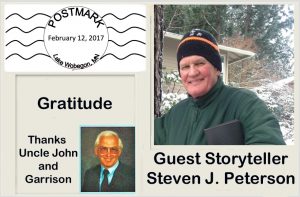
Or“Complaint is a mainstay of comedy,
so I am now experimenting
with a comedy of gratitude,
talking about parents, teachers,
lucky breaks, dumb things
that turned out smart.”
— Garrison Keillor
Watch out for “gum chewers,
cigarette suckers, and cosmetic users.”
— Uncle John
Thanks Uncle John and Garrison
On April 28, 2017, Garrison Keillor will perform at Concordia College, across the street from the Prairie Home Cemetery, in Moorhead, Minnesota, for what he is calling his “Gratitude Tour.” It is the Prairie Home Cemetery that Keillor credits for the inspiration to name his radio program.
In a recent Prairie Home Productions news release, Keillor wrote, “Complaint is a mainstay of comedy, so I am now experimenting with a comedy of gratitude, talking about parents, teachers, lucky breaks, dumb things that turned out smart.” My Uncle John would have loved to drive from his house about a mile over to Concordia to listen to Keillor’s comedy of gratitude.
From 1974 to 2016, Keillor hosted over 1500 Prairie Home Companion radio shows. That’s an astonishing number. Who knew so much could happen in a small Minnesota town out there on the edge of the prairie?

At his 90th birthday celebration, Uncle John with granddaughter Julia.
In August of 1974 I was introduced to the Prairie Home Companion radio program by my Uncle John a week or two after he first heard it on the local Minnesota Public Radio station, KCCM-FM, at Concordia College. He graduated from Concordia in 1952; I graduated in 1971. Uncle John brought his bulky AM/FM portable radio out to the picnic table in his backyard so we could listen to his recent discovery where we were eating corn on the cob and hot dogs on a humid Saturday evening. Prairie Home Companion first aired on July 6, 1974, and was broadcast on Minnesota Public Radio from Macalester College in St. Paul, not far from where Uncle John grew up with a younger brother and sister.
He was born in 1925, and after graduating high school from Minnehaha Academy in St. Paul, he entered the Navy to serve during World War II. In 1945 he was stationed at the Livermore Naval Air Station. When he and his wife Margaret visited me in the late 1980s in Livermore, we drove down East Avenue past Lawrence Livermore National Laboratory which had been the site of the Naval Air Station. Uncle John was very surprised that many buildings from when he was stationed there were still standing.
His parents died in a small plane crash in 1947 near Buffalo, Minnesota, and that tragic, life-changing event brought Uncle John and his brother and sister to Moorhead to live with an aunt. He attended Concordia, where he majored in biology, and found the professors to be especially welcoming and very supportive. All of his life he was a loyal alumnus.
This past July, two weeks after the last broadcast of Prairie Home Companion with Garrison Keillor, my Uncle John celebrated his 91st birthday. Parkinson’s disease had greatly reduced his ability to speak. His voice was weak and muddled but his intention to engage in conversation was strong. He always wanted to tell me a joke, he always wanted me to laugh, and he always wanted me to listen to “good” music, which for him ranged from a Bach hymn to songs by the Eagles.
Uncle John loved telling Norwegian jokes especially the ones about Ole and Lena. I can hear his laugh at the punch line when he told the one about Ole and Lena being married for 65 years, and Ole recounts how Lena had been with him through all his medical problems from gall bladder surgery to liver cancer, and then concludes, “Lena, I’m beginning to think you are bad luck.” Uncle John, who had been married to Margaret 64 years when he died this past September, appreciated the gift of a life-long partner with a tolerant sense of humor.
He was familiar with many communities like Garrison’s Lake Wobegon. During his career as a pharmaceutical sales rep in northern and western Minnesota, Uncle John loved talking with the local doctors, nurses, and patients, then heading to a nearby restaurant much like the Chatterbox Café in “real” places such as Ada, Bemidji, Elbow Lake, Pelican Rapids, and Thief River Falls.
I enjoyed that first broadcast I heard in 1974 at that backyard picnic table even though there was no news from Lake Wobegon. Keillor did not introduce listeners to the news from where all the women are strong, all the men are good looking, and all the children are above average, until 1977 while I was living in Europe.
In 1980 Prairie Home Companion began broadcasting to a national audience, so, when I returned to the United States in 1981 and was teaching in West Lafayette, Indiana, I was pleased to hear that the program Uncle John had introduced to me seven years before was thriving. Purdue University’s WBAA-FM aired the show every Saturday evening. Of the many amusing “sponsors” of Prairie Home Companion such as The American Duct Tape Council, Bob’s Bank (Save at the Sign of the Sock), The Fearmonger’s Shop, Raw Bits Breakfast Cereal (Oat hulls and wheat chaff — not for everybody), Powdermilk Biscuits (Heavens they’re tasty, and expeditious), I recall a phone conversation long ago made memorable by Uncle John’s asking the key question posed by one of the sponsors, “Wouldn’t this be a great time for a piece of rhubarb pie?” then singing (to the tune of Shortnin’ Bread) the Bebop-A-Rebop Rhubarb Pie jingle: “One little thing can revive a guy, And that’s a piece of rhubarb pie. Serve it up hot, maybe things aren’t as bad as you thought. Momma’s little baby loves rhubarb, rhubarb, Bebop-A-Rebop rhubarb pie.”
Keillor reported the News from Lake Wobegon with characters that were reminiscent of my relatives and friends and acquaintances while growing up in Minnesota. I suggested to my Purdue University students and colleagues that they listen to the program. One of my colleagues, a fellow Minnesotan, was an enthusiastic fan of the Prairie Home Companion. She had attended Gustavus Adolphus College, the home of the Gusties and a Swedish Lutheran liberal arts college, in St. Peter. I had attended Concordia, the home of the Cobbers and a Norwegian Lutheran liberal arts college, in Moorhead. We had a spirited, humorous rivalry about Gusties and Cobbers, and about Swedes and Norwegians. We had a common history of the folks we knew living in places like Lake Wobegon. Another Purdue colleague from New York City, proud of his Russian and Jewish heritage, was charmed by Keillor’s storytelling. He wanted to know if what Keillor said was true. He asked questions about unfamiliar things such as Luther League, lefse (a potato bread that looks like a tortilla), and ice fishing. We assured him that everything Keillor said accurately reflected the experiences we had in “real” Minnesota towns.
I have recommended Prairie Home Companion to many people since the early 1980s. I was always confident that the two-hour radio program was worth anyone’s time because of its variety of music, humor, and weekly news about people living on the edge of the prairie, in the little town that time forgot out there in central Minnesota’s Mist County.
In 1984 when I left Purdue for a career at Lawrence Livermore National Laboratory, I liked telling my new colleagues including Dan Sapone about Prairie Home Companion. Everyone I told had a favorable response and especially to the News from Lake Wobegon. Dan valued Keillor’s storytelling so I was grateful, then, and even more so now, that he taped the presentation Keillor gave at the National Press Club in 1987. I am pleased that I have kept the cassette tape, and I have listened to it numerous times.
In 1987 Keillor left Prairie Home Companion for 26 months. He explained that he had become too famous because his radio show had four million listeners. He could no longer live in anonymity, which as a shy person he wanted to do. He married his former high school sweetheart, an exchange student from Denmark, and moved to Copenhagen in the summer of 1987.
On Tuesday, October 20, 1987, Keillor appeared at the National Press Club in Washington, D.C., to promote his latest book, Leaving Home, a collection of monologues from the Prairie Home Companion. Dan taped that program for me while I was visiting the Oregon Shakespeare Festival in Ashland. It was the week that the Dow dropped 508 points (22.6%, down to 1738.74) and the Minnesota Twins were in the World Series for the first time since 1965.
In his formal comments to the National Press Club about the drastic drop of the Dow Jones Industrial Average on Monday, October 19, 1987, Keillor said, “We think the stock market crash is catastrophic but we are not sure. Is this the worst that can happen? We don’t know that. The newspapers are using second-coming type face. One says Panic! And the other says Crisis! But people back home in Minnesota are not affected by the 500-point drop of the stock market, rather they are riding high because the Minnesota Twins are in the World Series, playing the St. Louis Cardinals. We are a different kind of baseball fan. New York fans demand triumph. While in Minnesota we believe that whatever happens is probably our fault. We were brought up to wait and see. We believe that all things come to those who wait. Twins fans. Democrats. Investors. It will come around again. In 1980 I believed that Reagan could not be elected President of the United States, and in 1984 I believed that Walter Mondale could beat him. As 1988 approaches I believe that Ronald Reagan cannot be elected to a third term. Eventually you win.”

In the question-and-answer segment at the National Press Club, Keillor was asked if he missed his radio show. He replied, “I miss it terribly. I miss singing songs with people who know the words. I have found out that a storyteller has to keep working.” Fortunately, for his listeners he returned to the Prairie Home Companion in 1989. Keillor claimed that “eventually you win.” These days it is harder to believe that. We do not know the future. We do not know what is the worst that can happen.
In a July 26, 2016, New York Times column, Keillor wrote: “We made our mistakes back in the 20th century, Lord knows, but we never nominated a man for president who brags about not reading. … When I envision a Trump Presidential Library, I see enormous chandeliers and gold carpet and a thousand slot machines. God help us. I mean it. We’re in trouble down here.”
Uncle John enjoyed mimicking an old-time, extremely conservative Lutheran minister with a thick Norwegian accent warning the world about the dangers and evils of “gum chewers, cigarette suckers, and cosmetic users.” It was an amusing, attention-grabbing line because of his powerful voice and his twinkling eyes. I will always remember his warning about the untrustworthiness and dangers of these reckless people. Nowadays they do not simply chew gum or smoke cigarettes or put on cosmetics, rather they say things they do not mean.
When we celebrated Uncle John’s 90th birthday on July 18, 2015, he was wheel-chair bound, but his bright eyes assured us that he was ready for his party. He could barely speak because of Parkinson’s, but we were amazed and delighted that he could sing along with the Eagles’ “Peaceful Easy Feeling.” There wasn’t a dry eye in the room when he surprised us with his ability to sing.
Printed on the inside cover of the program for his funeral service last September: “A good fisherman knows a keeper when he sees one, he knows when to toss one back, and when to head for home.” Uncle John was a good fisherman. He appreciated the camaraderie or solitude of fishing on a lake or along the banks of a river. He enjoyed talking with other people and always found a way to find common ground. He had an infectious laugh and loved to tell a good joke. Even a bad one if it would make you groan. He always expressed gratitude for his wife and children and grandchildren, and for any day or evening he could go fishing.
Back in 1987, Keillor affirmed that a storyteller needs to work. Thirty years later in 2017, he continues to work and Uncle John would have loved to attend the Gratitude Tour this upcoming April. I suspect he would have especially wanted to hear Keillor talk about “dumb things that turned out smart.” I know Uncle John could tell a lot of stories about that.
![]()
Click here to download a PDF of this post: Peterson_ConVivio_Gratitude_2:13:17
Personal Syllabus — Lauren de Vore
My Syllabus
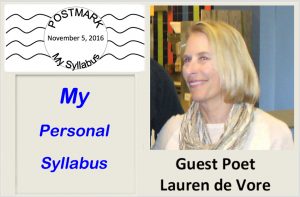
My Personal Syllabus
The Personal Syllabus Exercise:
“What are the books, stories, characters,
and ideas that help form a person?”
~Lauren de Vore~
My Personal Syllabus
~Lauren de Vore~
When I read The New York Times recent Op-Ed piece, “My Syllabus, My Self,” by Christy Wampole, I was caught by her premise that a syllabus is more than a reading list, that it’s “a personal and political statement.” I wondered, what would I include in a personal syllabus? Could I reach back across the years and identify the books and other pieces that have influenced me, that have shaped me? Could I put together a list such that someone who read those pieces could gain an understanding of me beyond what I put forward for the world to see?
Although there are myriad other “influencers” that have contributed to making me “me,” from music and artwork to movies, seminal events and remarkable people, for the purposes of this exercise, I limited myself to written pieces. In putting together my syllabus, the hard part was (1) separating favorite pieces from those that influenced me and then (2) trimming the list to a reasonable length. I kept thinking, “Oh, I should add that…and that…and that…” In the end, I offer a dozen or so poems and quotes and another dozen or so books. The first four (the Milton, Wilcox, Guest, and Whittier pieces) were regularly quoted from during my growing-up years; the others I collected along the way in the decades that followed. You probably already know some of these; for the others, who knows, you may be intrigued enough to go look them up.
Poems and Quotations
“Paradise Lost” (John Milton, Book 1)
“The mind is its own place, and in itself
Can make a Heaven of Hell, a Hell of Heaven.”
This is particularly compelling when you realize that this is Lucifer speaking shortly after he’s been expelled from Heaven …
“The Winds of Fate” (Ella Wheeler Wilcox)
One ship drives east and another drives west
With the self-same winds that blow.
Tis the set of the sails
And not the gales
Which tells us the way to go.
Like the winds of the seas are the ways of fate,
As we voyage along through the life:
Tis the set of a soul
That decides its goal,
And not the calm or the strife.
“Myself” (Edgar Albert Guest)
I have to live with myself and so
I want to be fit for myself to know.
I want to be able as days go by
Always to look myself straight in the eye;
I don’t want to stand with the setting sun
And hate myself for the things I have done.
I don’t want to keep on a closet shelf
A lot of secrets about myself
And fool myself as I come and go
Into thinking no one else will ever know
The kind of person I really am;
I don’t want to dress up myself in sham.
I want to go out with my head erect,
I want to deserve all men’s respect;
But here in the struggle for fame and wealth
I want to be able to like myself.
I don’t want to look at myself and know
Than I’m bluster and bluff and empty show.
I never can hide myself from me
For I see what others may never see
And I know what others may never know.
I never can fool myself and so,
Whatever happens, I want to be
Self-respecting and conscience free.
Quotes/Poems (John Greenleaf Whittier)
“If thou of fortune be bereft,
And in thy store there be but left
Two loaves, sell one, and with the dole
Buy hyacinths to feed thy soul.”
“Of all sad words of tongue or pen,
The saddest are these, ‘It might have been.”
“O Me! O Life!” (Walt Whitman, Leaves of Grass, 1892)
Oh me! Oh life! of the questions of these recurring,
Of the endless trains of the faithless, of cities fill’d with the foolish,
Of myself forever reproaching myself, (for who more foolish than I, and who more faithless?)
Of eyes that vainly crave the light, of the objects mean, of the struggle ever renew’d,
Of the poor results of all, of the plodding and sordid crowds I see around me,
Of the empty and useless years of the rest, with the rest me intertwined,
The question, O me! so sad, recurring—What good amid these, O me, O life?
Answer.
That you are here—that life exists and identity,
That the powerful play goes on, and you may contribute a verse.
“The Need of Being Versed in Country Things” (Robert Frost, 1920)
The house had gone to bring again
To the midnight sky a sunset glow.
Now the chimney was all of the house that stood,
Like a pistil after the petals go.
The barn opposed across the way,
That would have joined the house in flame
Had it been the will of the wind, was left
To bear forsaken the place’s name.
No more it opened with all one end
For teams that came by the stony road
To drum on the floor with scurrying hoofs
And brush the mow with the summer load.
The birds that came to it through the air
At broken windows flew out and in,
Their murmur more like the sigh we sigh
From too much dwelling on what has been.
Yet for them the lilac renewed its leaf,
And the aged elm, though touched with fire;
And the dry pump flung up an awkward arm;
And the fence post carried a strand of wire.
For them there was really nothing sad.
But though they rejoiced in the nest they kept,
One had to be versed in country things
Not to believe the phoebes wept.
“Nothing Gold Can Stay” (Robert Frost, 1923)
Nature’s first green is gold,
Her hardest hue to hold.
Her early leaf’s a flower;
But only so an hour.
Then leaf subsides to leaf.
So Eden sank to grief,
So dawn goes down to day.
Nothing gold can stay.
“The Summer Day” (Mary Oliver, 1992)
Who made the world?
Who made the swan, and the black bear?
Who made the grasshopper?
This grasshopper, I mean—
the one who has flung herself out of the grass,
the one who is eating sugar out of my hand,
who is moving her jaws back and forth instead of up and down—
who is gazing around with her enormous and complicated eyes.
Now she lifts her pale forearms and thoroughly washes her face.
Now she snaps her wings open, and floats away.
I don’t know exactly what a prayer is.
I do know how to pay attention, how to fall down
into the grass, how to kneel down in the grass,
how to be idle and blessed, how to stroll through the fields,
which is what I have been doing all day.
Tell me, what else should I have done?
Doesn’t everything die at last, and too soon?
Tell me, what is it you plan to do
with your one wild and precious life?
“Kissing a Horse” (Robert Wrigley, 2006)
Of the two spoiled, barn-sour geldings
we owned that year, it was Red—
skittish and prone to explode
even at fourteen years—who’d let me
hold to my face his own: the massive labyrinthine
caverns of the nostrils, the broad plain
up the head to the eyes. He’d let me stroke
his coarse chin whiskers and take
his soft meaty underlip
in my hands, press my man’s carnivorous
kiss to his grass-nipping upper half of one, just
so that I could smell
the long way his breath had come from the rain
and the sun, the lungs and the heart,
from a world that meant no harm.
“Touched by an Angel” (Maya Angelou, 1995)
We, unaccustomed to courage
exiles from delight
live coiled in shells of loneliness
until love leaves its high holy temple
and comes into our sight
to liberate us into life.
Love arrives
and in its train come ecstasies
old memories of pleasure
ancient histories of pain.
Yet if we are bold,
love strikes away the chains of fear
from our souls.
We are weaned from our timidity
In the flush of love’s light
we dare be brave
And suddenly we see
that love costs all we are
and will ever be.
Yet it is only love
which sets us free.
“The honorary duty of a human being is to love.” —Maya Angelou
“All my work, my life, everything I do is about survival, not just bare, awful, plodding survival, but survival with grace and faith. While one may encounter many defeats, one must not be defeated.” —Maya Angelou
“No man ever steps in the same river twice, for it is not the same river and he is not the same man.” —Heraclitus of Ephesus
Books
Black Like Me (John Howard Griffin, 1961)
A real eye-opener for an 11-year-old white girl living in suburban California.
Messages from My Father: A Memoir (Calvin Trillin, 1997)
“You might as well be a mensch.”
Alexander and the Terrible, Horrible, No Good, Very Bad Day (Judith Viorst, 1972)
“Some days are like that, even in Australia.”
The Pastures of Heaven (John Steinbeck, 1932)
Striving , ever striving to achieve unfulfillable aspirations (for love, connection, belonging, etc.) yet failing due to personal foibles or weaknesses—an everyman version of the classic hero myth.
The Red Pony (John Steinbeck, 1933)
“The Gift”: The hazard of loving…as soon as you admit you want something or care for somebody or something, it’s taken from you.
“The Promise”: Be very careful what you wish for; it often comes in ways you didn’t expect and with a cost far higher than you anticipated.
“Junius Maltby”: The soul-crushing effect of accepting another’s view of yourself instead of your own, of following the dictates of convention instead of being true to yourself.
Siddhartha (Herman Hesse, 1922)
“What could I say to you that would be of value, except that perhaps you seek too much, that as a result of your seeking you cannot find…”
“Words do not express thoughts very well. They always become a little different immediately after they are expressed, a little distorted, a little foolish. And yet it also…seems right that what is of value and wisdom to one man seems nonsense to another.”
1984 (George Orwell, 1949)
Newspeak, the fragility and strength of language, the idea that by eliminating words, their very concepts can be eliminated—particularly relevant vis a vis today’s thin skins combined with the current intolerant obsession with political correctness.
Tales from Shakespeare (Charles and Mary Lamb)
Planted the seeds for a love of Shakespeare, playing with words, live theater…
The Winter’s Tale: “Exit, pursued by bear.”
Hamlet:
“A man may fish with the worm that hath eat of a king, and eat of
of the fish that hath fed of that worm. … What dost you mean by
this? … Nothing but to show you how a king may go a progress
through the guts of a beggar.”
Penseés (Blaise Pascal, 1688)
The great gamble—believe/live as if God exists and he does, you have gained everything; believe and he doesn’t exist, you have lost nothing… I vehemently disagree—you have lost dreadfully if you have not valued this life and lived it fully.
Black Beauty (Anna Sewell, 1877)
“…there is no religion without love, and people may talk as much as they like about their religion, but if it does not teach them to be good and kind to man and beast, it is all a sham…”
Bulfinch’s Mythology: The Age of Fable, or Stories of Gods and Heroes
Don’t piss off the gods.
Into the Woods (Stephen Sondheim and James Lapine, 1986)
Beware what comes after “happily ever after.”
Candide (Voltaire, 1759)
“All is for the best, for we live in the best of all possible worlds.”
“We must cultivate our own gardens.”
Snow Globe
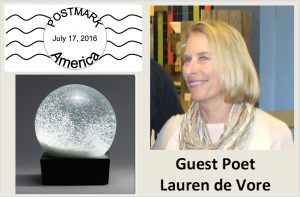
I read the news this morning. Yet another shooting, this time, police ambushed in Baton Rouge. Even as my heart wrenched, my cynical (benumbed?) mind wondered what it would be tomorrow—civilian or law enforcement? terrorist or home-grown? individual or mass? As horrid as these events are, we must bear witness to them. We must talk. We must act. Otherwise, nothing changes.
====================================================================
Snow Globe
A shot, a siren.
A siren, a shot.
Does it matter which is first?
Either way someone’s dead.
One life ended,
Others destroyed—
The shot, the shooter,
Those left behind.
The act, the image.
The image, the outrage.
Marches, protests,
Funerals.
Pulpits, airwaves
Fill with eloquence,
Prayers and pleas
And vows for change.
Yet where’s the outrage
When nothing changes?
Black skin, brown skin,
White skin, tan,
Blue jeans, badge,
Crescent, cross, six-point star.
Does it matter who bleeds first?
Either way blood is spilt,
Hands are stained,
Souls are rended.
Vengeance, justice,
Someone tell me,
What’s the difference?
Shake a snow globe,
Glittering flakes in fury swirl,
Slacken, then subside.
A shot, a siren.
A siren, a shot.
Yet again a life is ended.
Yet again the globe’s upended.
Yet again nothing changes.
(Lauren de Vore, July 17, 2016)
Download “Snow Globe” in PDF: ConVivio_Snow_Globe_DeVore_7_17_2016
Guest Poet: Lauren de Vore, National Poetry Month 2015 Continues . . .
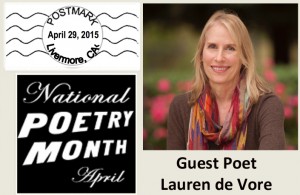 Well, this is a completely new experience for me, a coming out of my poet’s closet so to speak. After spending my working years as a science writer/technical editor, it’s a real treat now to spend time writing what I want to write! To my surprise, I find myself writing poetry.
Well, this is a completely new experience for me, a coming out of my poet’s closet so to speak. After spending my working years as a science writer/technical editor, it’s a real treat now to spend time writing what I want to write! To my surprise, I find myself writing poetry.
I’ve always loved the sound and rhythm of words, and some of my earliest memories are of being read to—fairy tales, classic children’s stories, and poems, lots and lots of poems. Remember “Lines on the Antiquity of Microbes” (subtitled “Fleas” by Strickland Gillilan): “Adam/Had ‘em.”, reputedly the shortest poem ever published? Or how about the hypnotic verses of Robert Service: “There are strange things done in the midnight sun by the men who moil for gold…”?
As I found pleasure in the writing of the following poems, I hope you find pleasure reading them.
==================== Click here for a PDF of this post: ConVivio Guest Post ldv r2
Like Dan, I love Yosemite. As spectacular as spring and early summer can be, fall is actually my favorite time there; the days are still warm but the nights are crisp and, with the crowds gone, the valley is quietly settling down for the winter. Regardless of season, there is something spiritual about the place. I wrote the following poem last June after an early morning walk.
Morning Walk
Lauren de Vore (July 3, 2014)
I rose at dawn one summer morn
Something was calling me
A gift to see the day new born
Here in Yosemite
The forest duff held yestreen’s heat
Meadow grass bowed with dew
I watched the silent stars retreat
Dark eased its sable hue
With reverence I inhaled deep
All was hushed, nothing stirred
So perfect, pure that I could weep
Silver song of first bird
Such sanctity in every rock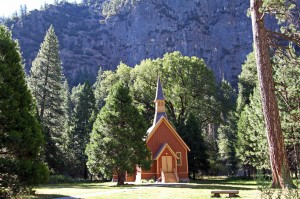
Waterfall river pool
All mysteries reveal, unlock
Here in God’s vestibule
I walked till gray gave way to light
Granite in bas-relief
A simple chapel met my sight
Edifice for belief
Seems strange that midst this majesty
Man constructs walls and roof
In searching for divinity
Indoors he turns for proof
Perhaps too much to face full-blazed
Unfiltered gaze of God
Within a structure man has raised
There finds it safe to laud
A gentle breeze whispered my way
Gratia domini
Whate’er the day it’s Sabbath day
Here in Yosemite
===================
I’ve long been a fan of Walt Whitman, even before I went to Whitman College. And no, the college was not named for the poet but for a missionary, Marcus Whitman, who in settling the Walla Walla valley managed to wipe out most of the native inhabitants with a measles epidemic; the understandably irate survivors then massacred Marcus and his settlers. History lesson aside, do you remember Apple’s commercial for last year’s Superbowl, “…the powerful play goes on, and you may contribute a verse.”? That’s a line from the poem “O Me! O Life!” (http://www.poetryfoundation.org/poem/182088) in Whitman’s “Leaves of Grass.”
My verse is below. I think everyone, at some point or another, contemplates legacy. Very few of us have the opportunity, talent and/or fortitude to make a difference in the grand scheme of things. But on the smaller, more human scale…
My Verse
Lauren de Vore (Feb 27, 2014)
My verse, Mr. Whitman,
Is but a small verse, a simple verse,
One of quiet striving to find a place to fit in,
A way to leave the world better, if only a bit, than before.
I have asked the larger questions but only lightly,
For I am one more inclined to nurture dragons than slay them;
I have loved well but without grand passion,
For I am better suited to live on the plains, in the lea not the face of the storm;
I have shed tears over the struggle and injustice,
But cried also over the beauty and sheer joy of it all.
Many are the times I should have done, could have done,
But more are the times I did.
And so, mine is a simple verse—a son, a handful of friends,
A smattering of follies and kindnesses, of ordinary tragedies and triumphs.
I have not shaken the earth for good or ill,
But I have lived. I am here.
====================
Since we’re recognizing National Poetry Month, here are several poems about words, poets and poetry. There’s a lot of verbiage about poetry being transcendent, sublime, profound, etc. I’m always a bit put off by these superlatives. Some poetry is indeed extraordinary and inspiring, and I suspect many poets have ambitions toward that end. But such characterizations can make poetry seem intimidating and set it beyond the ken and interest of ordinary writers and readers. It’s important to remember that poetry is also fun, and that less-than profound poems are every bit as valuable, and often more enjoyable, than the critically acclaimed “greats.”
====================
This is my little rebuttal to literary critics who extol poetry in highfalutin terms and to poets who cultivate the abstruse in an attempt to be profound. As an aside, I’m very fond of sonnets. I like the challenge of working within the constraints of the sonnet’s structure, meter and rhyme—specifically, 14 lines consisting of three quatrains and a concluding couplet in iambic pentameter with an ABAB or ABBA rhyming scheme. (If you’ve ever taken a music theory class, writing a sonnet is similar to being presented with the melody line and figured bass for a Bach chorale and working to fill in the other three parts. And then, of course, comes the lesson in humility when, after hours of struggle on your own composition, Bach’s version is revealed! The same thing happens when I read Shakespeare’s sonnets.)
Thoughts Profound
Lauren de Vore (Apr. 10, 2014)
The poet’s task can be formidable
For if one’s aim is poetry profound,
One must, as precedent, think thoughts profound
(Though not completely inexplicable).
But if a thought seems deep or sage to me,
I wonder is it so? Perhaps it’s just
My ignorance, something that’s been discussed
And shelved long since by those more scholarly.
But then I think, ne’er mind those dusty tomes,
Th’idea’s new to me. And so I pense
The thoughts and images as they make sense
To me, and in the process pen my poems.
I think it matters not what’s deemed profound,
But that one thinks and ventures to expound.
====================
Standing in the shower, hot water streaming over my shoulders, is often a creative time for me. Possibilities for new poems emerge, solutions to difficulties with in-progress poems arise. But then, dripping wet, I have to quickly find something to scribble on before the ideas evaporate with the steam!
Musing
Lauren de Vore (Feb. 19, 2014)
Why is it that when inspiration strikes,
I’m always in the shower or in bed
Near sleep with naught to write upon to catch
Those fleeting sparks of wit, those crystal drops
Of insight evanescent in the light
Of day? Perhaps there is some muse who likes
To tease, to pendulate a slender thread
Of perfect prose or rhyme sublime, then snatch
It back while laughing from the mountaintops.
Yet if these tricks amuse the muse, no spite
I’ll hold, for any hint poetic psyches
Me up and sets thoughts spinning in my head.
Come morn, with pen in hand I’ll chicken-scratch
Till phrases coalesce in starts and stops,
Like smoke rings that shine brightly then take flight.
And though I might prefer some clearer spikes
Of inspiration, mileage posts instead
Of traces drawn by bits of straw and thatch,
I welcome any literary sops
That come my way. For I know when the right
Words finally align in proper queues,
The poem belongs to me and not the muse.
====================
Words are like people. Some are practical and purposeful. Some are demanding and ambitious or exuberant and frivolous. Others are somber and melancholy or perhaps persnickety and precise. And playing with them is just plain fun.
Old Friends
Lauren de Vore (June 14, 2014)
One of the nicest things now I have time to write
Is chance to reacquaint myself with long-lost friends.
In searching for the perfect phrase or rhyme just right
As thought in prose or poem sinuously wends
Its way from brain to page, I’ve happened on a host
Of lovely words I met, oh, years ago, but long
Forgot midst press of workday life. So here’s a toast
To all the vocables that make a language song,
An art, a mental exercise, a game of tones.
Some are celebrities, imposing cynosures
That daunt for fear their inept use engender groans.
Others inveigle as they dangle sapid lures
To those who strive to find t’exact mot juste
As anodyne for verbal hebetude. The twee
And chary, risible and coy’ve returned to roost
Within my newly ‘larged vocabulology,
And in their company I’ve wambled far and wide
Through literary dingle, kloof and weald. Although
At times I balter in their syllables, beside
Their usual kith and kin they’re far more apropos
And much more fun to know. And so I set myself
The goal each day to use at least one quirky word
That else would molder on some dusty reference shelf.
Eyebrows may rise and people think me most absurd,
But words unused are eas’ly lost, and in their loss
Is language dimmed, for words are more than letters in
A row but filled with meme and meaning stretched across
The years. When words are lost, the concepts held within
Are also lost and soon or late th’ability
To think those thoughts recedes beyond recall. And so
My game of tones is more than vain legerity
But quest to save the tools we need to think and know
And understand. And after all, these words are friends,
And friendship true perdures despite mere fads and trends.
====================
I was always the nerdy kid, the one with glasses and braces who actually liked school and read poetry even when it wasn’t assigned. In fact, one of my favorite poems was (and still is) Robert Browning’s “The Bishop Orders his Tomb at Saint Praxed’s Church” (http://www.poetryfoundation.org/poem/173002). On a recent rereading, it struck me how much one’s enjoyment of such poems depends on knowledge of the “cultural literacy” of the era in which the poem was written. The verse below attempts to reflect on this realization.
A Poet’s Admonition
Lauren de Vore (Dec. 6, 2013)
A passing survey of lauded poets of yore
Reveals what may be a vexing predicament
For would-be bards of today, for tis evident
That the sonnets and odes English teachers adore
Are brimming with analogies from history,
Legend and myth. These allusionary subjects,
While once in common grasp, now baffle and perplex
All but the super-erudite and scholarly.
For who today knows ‘nough of Ozymandias
Or Cuchulain or Lochinvar to apprehend
The poet’s nuance? Be they villain or godsend,
Their deeds are lost to time, their names are powerless.
Thus must the twenty-first-century poet ask,
What is the current coin of history and myth,
The people and places that will register with
Readers today and in years to come? Quite a task
To choose amongst Lincoln, Mandela, or Gandhi,
‘Twixt Birkenau and Abu Ghraib. And which of these,
If any, will have meaning in the centuries
Ahead when poet too is part of history?
No matter how important now, most everyone
And every deed will likely be forgot in time
As memory must pick and choose which are sublime
And worth remembering, the rest to jettison.
Perhaps this is the poet’s task, to search the dross
And find the diamonds bright, and by the craft transform
Mere mortals into myth.
Mere mortals into myth . Bard choose well, for you form
The future’s view of history, a heavy cross
Indeed to bear. But every age has need of lore,
And hist’ry books though filled with facts are dreary works.
But stories tell with rhythm and with rhyming verse,
And oft the parables evolve to something more.
So poet hone your tales and wisely wield your pen,
For they may well have powers far beyond your ken.
====================
These next two poems started out simply as observations of scenes but evolved into something a bit more.
Big Sur Coast
Lauren de Vore (Feb. 24, 2015)
On high I watch the breakers pound the shore.
With foaming wrath they protest journey’s end,
As if through sound and fury they could rend
The cliffs and force the land to yield before
Their watery might. No restful overlook
This bluff of mine, with naught for company
But screaming gulls and one lone cypress tree.
Though meager shelter ‘gainst the wind, in crook
Of twisted trunk I stand, eyes squinting in
The glare. With every thundering crash I feel
The temper in each surge of liquid steel,
Frustration that the race is run and win
Or lose ‘tis done. Thus so I reckon feels
The river as it empties in the sea,
As well th’explorer trekking westerly
Till dry land ends and squatting on his heels
Curses the ocean now his westering days
Are done. And yet the rivers ever run,
And though the strand is strewn with those who shun
The sea’s untamed expanse, the restless gaze
Beyond the known and venture ever on.
Around the globe, by tempests tossed, by ice
And fire burned, be’t hell or paradise
They tarry not as onwards they are drawn.
And when at last the last frontier’s been breached,
When all the empty lands are overrun,
What of the ones who chase the setting sun,
Now that the questing’s done, the limit’s reached?
I watch the breakers crash upon the shore
Refusing to accept that journeys end.
As daylight fades, down from my bluff I wend
And know the waves will pound forevermore.
====================
I’m convinced that all cats, just before they are born, are sworn to secrecy about all things feline!
Cat
Lauren de Vore (April 15, 2015)
So sleek and elegant, tuxedo-clad, my cat
Sits crouched upon the hearth and stares unblinking at
The dancing flames and glowing coals. What see you there,
Oh cat who deigns to share my bed and meager fare,
Deep in the fire’s heart? Across the eons do
You gaze, when deepest darkest Africa was new,
When mighty beasts, not man, did rule the plains and you
Perhaps the leader of some simban pride? Or do
You see the ancient pyramids when cats were viewed
As gods, were worshipped, idolized, their favors wooed?
Can you tap mem’ries from the days beyond recall?
You’ve prowled the fetid alleys and the king’s great hall
As Black Death carried off both rich and poor. You’ve sailed
Around the world, in countless armies’ van you’ve trailed,
You’ve watched as tempests swirled and battles raged and seen
The course of hist’ry changed. Oh cat of midnight sheen,
The flick’ring flames reflect within your slitted eyes,
Their ever-changing scintillations hypnotize.
Can you not give me just a hint of what you see,
Of all that’s feline, foreign and thus hid from me?
Still as a statue, full of secrets, staring at
The swirling fire, so sits my sleek and silent cat.
====================
Every writer is, I suspect, an avid reader—a good thing too, since where would writers be without readers?
Selfish
Lauren de Vore (Jan. 6, 2014)
My reading time is precious time, my selfish time.
So if you see me with a book, don’t talk to me,
Don’t ask me what I’m doing—reading, duh—or if
It’s good—it is, I wouldn’t read it otherwise.
And if you do, don’t be surprised or captious when
I scowl as I reluctantly reply. And should
You then decide to choose a book or magazine
Yourself to read, please be forewarned that reading’s not
A group activity. Repress, nay kill the urge
To interrupt to ask to read me “just one thing.”
Though I may acquiesce with barely stifled sigh,
The answer’s really “no.” For I am far away
Within the pages of my book—another time,
Another place—and hauling back to here and now
Is maddening beyond belief. Tis selfish, true,
Such solitude to seek and churlish to resent
Its breach. But since I have no secret place in which
To hide away and read, domestic bliss would be
Enhanced by silence till I’ve closed my book and joined
Again the present day and ever-patient spouse.
===================
And finally a little something haiku-ish…
Birdsong in a minor key
Shatters the fragile shell of dawn.
Daybreak.
Many thanks to my husband, Paul Jackson, for the photos. (You should have an exhibit some day!)
— Lauren de Vore
April Is Still National Poetry Month — Part Two
Four Poems From ConVivio’s First Guest Poet
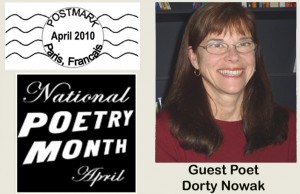 Dorty Nowak is a writer and artist living in Paris and Berkeley who writes frequently about the challenges and delights of multi-cultural living. A former educator and insurance executive, she helped found the Oakland School for the Arts. She is currently developing a collaborative project, ”Where Do I Belong,” involving artists and poets from Europe, Australia, and the U.S.
Dorty Nowak is a writer and artist living in Paris and Berkeley who writes frequently about the challenges and delights of multi-cultural living. A former educator and insurance executive, she helped found the Oakland School for the Arts. She is currently developing a collaborative project, ”Where Do I Belong,” involving artists and poets from Europe, Australia, and the U.S.
In response to our recent ‘National Poetry Month’ post, Dorty offers a couple of her favorites by Richard Wilbur and Wallace Stevens; and, she says, “because I’ll never pass up a chance for extra credit” she gives us two of her own creations. To introduce her own poems, “Windsurfer“ and “Haiku“ (below), she writes: “Recently I have been experimenting with various poetic forms. I particularly like haiku because the form demands a deceptive simplicity. I wrote “Windsurfers” while sitting on a beach in Mexico last year watching my friends windsurf. I was captivated by their skill and beauty.” — Dorty.
Since ‘National Poetry Month’ is . . . well . . . a month long, she hopes others will take this opportunity to contribute some of their favorites.
Some of Dorty’s recent contributions to the world of ideas can also be found at the “Your Life Is A Trip” blog at: http://www.yourlifeisatrip.com/home/author/dortynowak
◊◊◊◊◊◊◊◊◊◊◊◊◊◊◊◊◊◊◊◊
Love Calls Us to the Things of This World
by Richard Wilbur
The eyes open to a cry of pulleys,
And spirited from sleep, the astounded soul
Hangs for a moment bodiless and simple
As false dawn.
Outside the open window
The morning air is all awash with angels.
Some are in bed-sheets, some are in blouses,
Some are in smocks: but truly there they are.
Now they are rising together in calm swells
Of halcyon feeling, filling whatever they wear
With the deep joy of their impersonal breathing;
Now they are flying in place, conveying
The terrible speed of their omnipresence, moving
And staying like white water; and now of a sudden
They swoon down into so rapt a quiet
That nobody seems to be there.
The soul shrinks
From all that is about to remember,
From the punctual rape of every blessed day,
And cries,
“Oh, let there be nothing on earth but laundry,
Nothing but rosy hands in the rising steam
And clear dances done in the sight of heaven.”
Yet, as the sun acknowledges
With a warm look the world’s hunks and colors,
The soul descends once more in bitter love
To accept the waking body, saying now
In a changed voice as the man yawns and rises,
“Bring them down from their ruddy gallows;
Let there be clean linen for the backs of thieves;
Let lovers go fresh and sweet to be undone,
And the heaviest nuns walk in a pure floating
Of dark habits,
keeping their difficult balance.”
The Snow Man
by Wallace Stevens
One must have a mind of winter
To regard the frost and the boughs
Of the pine-trees crusted with snow;
And have been cold a long time
To behold the junipers shagged with ice,
The spruces rough in the distant glitter
Of the January sun; and not to think
Of any misery in the sound of the wind,
In the sound of a few leaves,
Which is the sound of the land
Full of the same wind
That is blowing in the same bare place
For the listener, who listens in the snow,
And, nothing himself, beholds
Nothing that is not there and the nothing that is.
Windsurfers
by Dorty Nowak
Oil slicked bodies stretch and strain,
Hold their wings against the pull of wind.
Born from the chrysalis of board and sail,
A host of dragonflies.
Sails skim the surface of the sea,
Their colors flashing in the sun.
They swoop and flit to quilt the waves.
They seem, if only for a moment, to fly.
What grace to break the human bond,
To bend such power to their ways,
Calling on gods of wind and wave,
To transform them as they play.
Haiku
by Dorty Nowak
Irrefutable
your logic sticks like a bone
in just the wrong place
◊◊◊◊◊◊◊◊◊◊◊◊◊◊◊◊◊◊◊◊
As always, your comments are always welcome and we would still like to see more of your favorite poems in this space. There are still three full weeks left in National Poetry Month!


